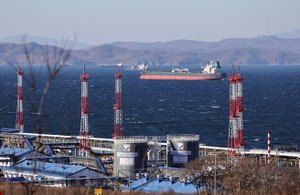Exclusive-Russia's 2024 seaborne oil product exports hit by headwinds, including drone attacks
Published by Global Banking & Finance Review®
Posted on January 17, 2025
2 min readLast updated: January 27, 2026

Published by Global Banking & Finance Review®
Posted on January 17, 2025
2 min readLast updated: January 27, 2026

Russia's oil exports dropped 9% in 2024 due to drone attacks, export bans, and rising costs, with a slight recovery in December.
MOSCOW (Reuters) - Russia's seaborne oil product exports fell by 9.1% to 113.7 million metric tons last year as the country's oil refineries faced headwinds including Ukrainian drone attacks, an export ban, falling prices and higher input costs, industry data shows.
Ukraine targeted several Russian refineries and fuel facilities, including Lukoil's Volgograd refinery, Gazprom Neft's Omsk oil refinery in western Siberia, the Slavyansk and Novoshakhtinsk refineries and Rosneft's Black Sea oil refinery in Tuapse.
Russian refineries also experienced financial pressures due to falling prices for oil products, rising raw material costs and Russia's ban on gasoline exports, market sources said.
As a result, Russian oil processing fell to around 267 million metric tons in 2024, its lowest level since 2012, as unplanned outages and weaker margins took their toll, Reuters calculations based on data from market sources showed.
Total oil product exports via the Baltic ports of Primorsk, Vysotsk, St. Petersburg and Ust-Luga fell by 9% in 2024 from the previous year to 61.96 million tons, the data showed.
Fuel exports via Russia's Black Sea and Azov Sea ports fell to 42.75 million tons, down 10% from 2023.
Oil products export loadings via the Russian Black Sea port of Tuapse fell by a third to 9.1 million tons due to outages after drone attacks, suspended processing and decreased refining at Rosneft's refinery, market sources told Reuters.
At the same time, Russian fuel exports via the Black Sea port of Novorossiisk rose 4% to 19 million tons, data showed.
Oil product export supplies from Russia's Arctic ports of Murmansk and Arkhangelsk fell to 1.01 million tons, down 14%, while fuel export loadings at Far East ports fell 3% from 2023 to 7.97 million tons.
Russia's seaborne oil product exports rose 10.8% month on month in December to 10.37 million tons, including 4.17 million tons loaded via Russia's Black Sea and Azov Sea ports, 5.49 million tons through Baltic Sea ports and 637,100 tons via Russia`s Far East ports, data from sources and Reuters calculations showed.
(Reporting by Reuters; Editing by Alexander Smith)
The article discusses the decline in Russia's seaborne oil exports in 2024 due to various challenges including drone attacks and export bans.
Drone attacks targeted several Russian refineries, causing outages and reduced oil processing, impacting export volumes.
Exports via Baltic and Black Sea ports declined, with significant drops in the Tuapse and Arctic ports.
Explore more articles in the Finance category
